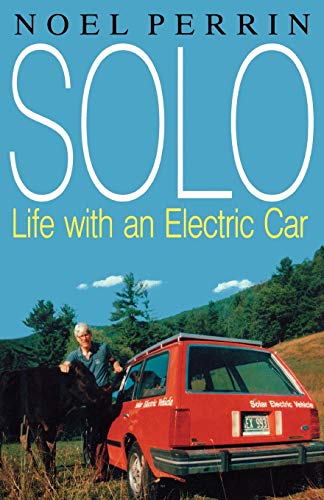
As a self-identified environmentalist and an early adopter I purchased a Toyota Prius in January 2001. I drove it proudly.
In 2014 I decided to "go electric". I chose the greenest car on the planet - the BMW i-3. The car was very quick, very smooth, very quiet, very high quality, and very green. It just didn't go very far.
The short range of 70 miles was sometimes a real challenge. Driving from Davis to Santa Cruz required two stops of about 45 minutes each to charge at an EVgo fast charge station. I accepted this inconvenience because I was doing my part to save the planet. I learned to "not be in a hurry" - which is a good philosophy of Life.
So, yes, I was feeling rather smug. Then I happened across a book entitled, "SOLO: Life with an Electric Car", by Noel Perrin.

Written in 1992 it chronicles his adventures with an electric car. Talk about an early adopter! In 1991 Perrin was a professor of Environmental Studies at Dartmouth College in New Hampshire. His students had challenged him – asking how he could justify driving a gas-guzzling farm truck 13 miles every day to get to class from his home in Vermont. He promised his students that before the end of the term he would have a pollution free way of getting to class.
He ended up purchasing a used Ford Escort station wagon that had been converted to use electric power with 18 lead-acid batteries. It even had solar panels - 4 on the roof and 2 on the hood. The car was produced by a company named Solar Electric Engineering in Santa Rosa, California. The plan was to fly out to get the car and drive it home cross-country! He understood that the car's range was about 40-60 miles and that he would need to charge it on a 110 volt circuit for 6 to 8 hours before he could drive again. He acquired a trove of maps from AAA and was pretty sure he could make it.
It did not turn out how he had hoped. There were many misadventures along the way and he wrote about them in a very engaging and entertaining fashion.
The book offers a historical perspective: "In 1903 electric cars were the favorite of city aristocrats. Tiffany's bought electric delivery trucks. President Woodrow Wilson took drives from the White House in his electric car with a Secret Service agent chugging along behind in a gasoline vehicle. Henry Ford owned three. No wonder. Electric cars were cleaner, quieter, and more reliable than early gasoline cars."
He gushes about the bright future of electric cars in a very (overly) optimistic way: "Every major automobile company in the world is either making one or getting ready to make one. Almost every government in the industrialized world is providing incentives for this to happen. Germany, for example, recently exempted EV-owners from user taxes for a period of five years. The French government is deeply involved with a plan to introduce EVs in twenty two French cities, each of which will have both standard and special rapid (i.e. high voltage) charging stations. ... Here at home, not only the federal government but around twenty of the states offer various inducements to makers and buyers of EVs, and four have flat-out requirements. By far the best known is California's requirement that the first 2 percent, then 5 percent, then 10 percent of all new cars sold there be zero-emission. That is to say, electric. The rule takes effect in 1998, 2 percent begins that year."
He discussed research into new types of batteries: nickel-iron, zinc, lithium, sulfur-aluminum, sodium, nickel-metal-hydride, and nickel-cadmium.
All in all a fascinating look at the state of electric cars THIRTY years ago!
I am no longer feeling smug.
From two reviews of the book:
"One can only love the bemused and self-deprecating Perrin . . . He spins the technical patter of electric cars and solar energy into lucid and appealing prose. John McPhee could not have put it better." - Chicago Sun Times
"Thirty years from now, when we're all driving electric cars, we'll look back on this book as astonishingly prescient and amusingly quaint. Nowadays we can read it to share the adventures of a pioneer." - Professor Donella Meadows